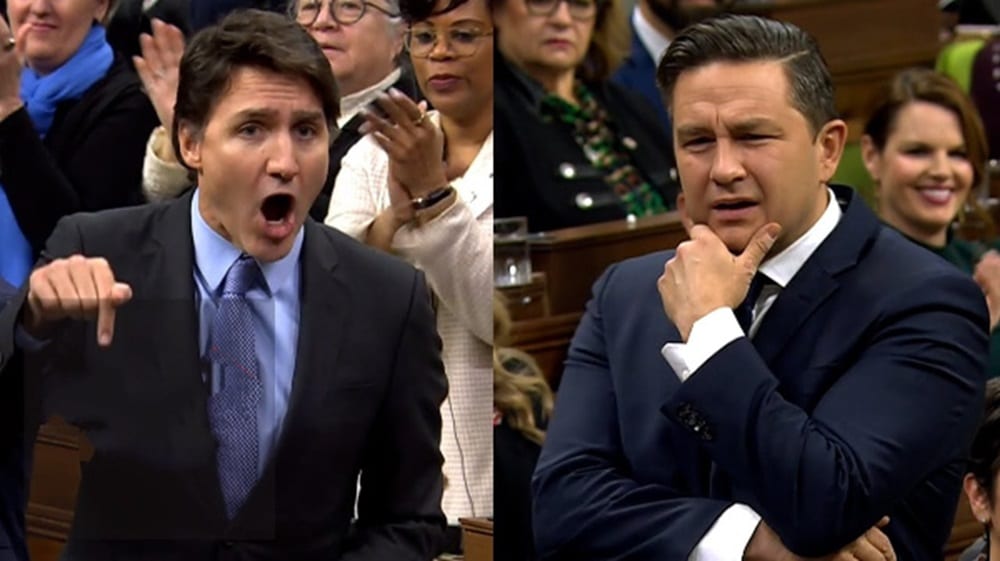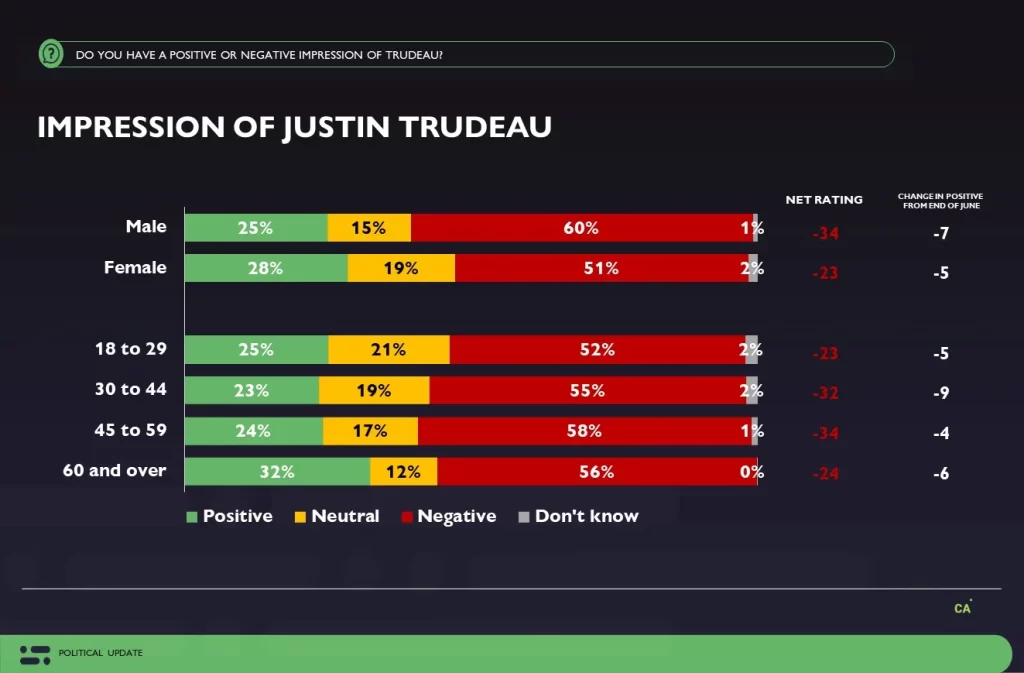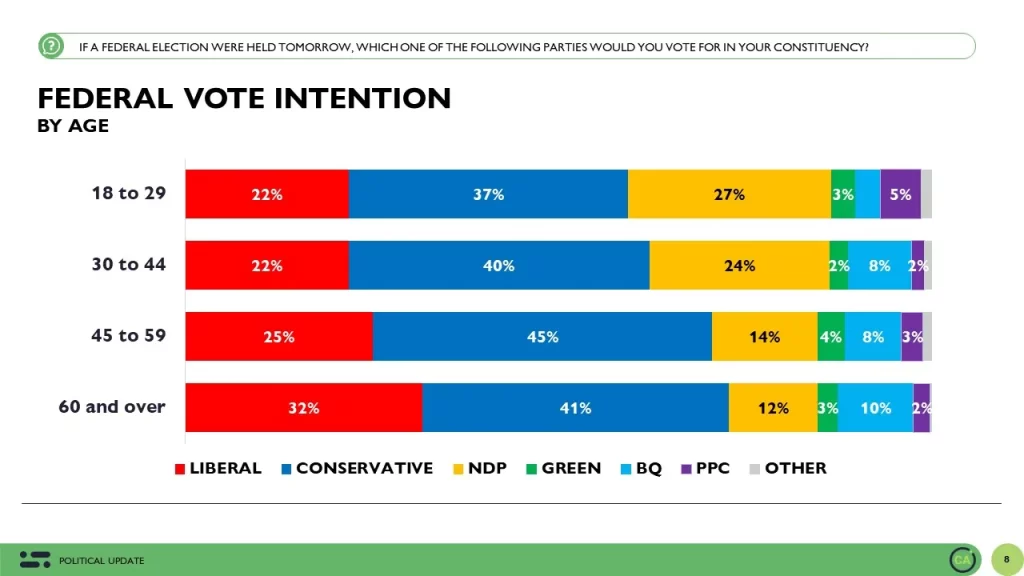Politics
Canada’s Conservative Leader Labels Justin Trudeau a “Wacko” Ejected from Parliament

Pierre Poilievre, the leader of Canada’s Conservative Party, was expelled from the House of Commons on Tuesday after calling Prime Minister Justin Trudeau “a wacko,” in the latest clash between two men who will face off in an election next year.
The official opposition Conservatives are way ahead in the polls. The incident began when opposition leader Pierre Poilievre criticized Trudeau’s alleged inability to crack down on drug overdoses.
“When will we put an end to this wacko policy by this wacko prime minister?” he questioned Trudeau in the House of Commons, the elected lower chamber.
Speaker Greg Fergus, a Liberal, warned Poilievre that his comment was unparliamentary and unacceptable, and urged him to retract it four times. Poilievre declined on each occasion, stating that he would instead use the terms extremist or radical.
Fergus warned Poilievre that he was rejecting the speaker’s authority and, in a rare action, declared, “I order you to withdraw from the House… for the remainder of this day’s sitting.”
Poilievre, who exited the chamber with his legislators, later reiterated his criticism of Trudeau’s drug policies.
“This is a wacko policy from a wacko PM that’s destroying lives,” he wrote on social media.
Justin Trudeau has a tense relationship with Poilievre, whom he erroneously accuses of being an extreme and supporter of former US President Donald Trump’s Make America Great Again campaign.
Trudeau had previously talked with mainstream reporters on Tuesday, accusing Mr. Poilievre of spending time with far-right groups.
“This isn’t responsible leadership. “That is dangerous for democracy and dangerous for Canadians,” he stated.
Ejections from Canada’s Parliament are uncommon. The speaker’s office did not immediately respond to questions about the last time a leader of the official opposition was kicked out.
Gen Z and Millennials Hate Justin Trudeau
The next Canadian election must take place by late October 2025. Public opinion polls show the Conservatives would win a big majority over the far-left Liberals, who have been in power since November 2015 courtesy to a coalition with the NDP.
According to polls, youth today dislike Trudeau more than ever before, and those who were born during the Trudeau administration despise it more than anybody else.
A series of Angus Reid Institute polls demonstrate that young people now despise the Trudeau government more than ever.
A Thursday poll asked Canadians under the age of 24 if Prime Minister Justin Trudeau was “working in the best interests of their generation.” Seventy-one percent said “no.”
To be fair to Trudeau, vast majorities of Canadians across generations did not regard him as working in their best interests — but the displeasure was greatest among those who came of age after the Liberals’ 2015 election victory.
Seniors, on the other hand, continued to be Trudeau’s most loyal supporters. Among respondents aged 65 and older, 69 percent disagreed with Trudeau’s government stance, while 28 percent considered the Liberals as representing their “best interests.”

Gen Z and Millennials are Turning Away from Trudeau
The corresponding figure among under-24s was 15%, the lowest of any other age cohort.
Under-24s were also the least inclined to consider Trudeau as the best candidate for prime minister. While a slender plurality preferred Conservative Pierre Poilievre in the PMO (25 percent over 23 percent for NDP Leader Jagmeet Singh), only 10% supported Trudeau.
“There appears to be much work to do for Trudeau to win over Gen Z and Millennial voters, even in the wake of a budget designed to address their concerns,” according to an Angus Reid Institute analysis of the figures.
The study was done after the Liberals introduced a federal budget titled “Fairness for Every Generation.” The word “fairness” appeared 50 times in the official budget paper, and all of its major initiatives — from affordable housing pledges to a rise in the capital gains tax — were framed as symbols of “generational fairness.”
“Taxing capital gains is not a party issue. In her budget statement on April 16, Finance Minister Chrystia Freeland stated, “It is an idea that everyone who cares about fairness should support.”
Thursday’s study on generational fairness adds to another Angus Reid poll issued this week, which found that Liberal support among under-24 voters has reached an all-time low.
According to a recent poll, only 12% of Canadians aged 18 to 34 favor the Liberal Party of Canada. That is not simply the lowest of any age category, but of practically any other voting component that Angus Reid pollsters could think of.
The only other voter group that was more anti-Trudeau than young voters was those who gave their address as Edmonton, Alta.; only 9% of Edmontonians planned to vote Liberal.

Gen Z and Millennials are Turning Away from Trudeau
Even Calgary ended up being slightly more liberal than the average Canadian in their early twenties. In the heart of the Conservative heartland, the Liberals polled one point higher, at 13%.
For more than a year, the Conservatives have enjoyed strong support among young Canadians. In September, an Abacus Data poll revealed the surprise result that Poilievre was more popular among Canadian youth than among Canadian seniors, a position nearly unique for a conservative leader.
In recent months, forecasts have shown the Tories on course for a supermajority in the next election, thanks mostly to under-34 voters defecting from the Liberals to the Conservatives.
However, new Angus Reid Institute data suggest that, after losing millions of followers, the Liberals are now losing voters to the NDP.
Under-34s were evenly divided between the NDP and the Liberals at the start of 2024 (a Jan. 22 survey placed them at 22% and 20%, respectively).
According to Wednesday’s Angus Reid poll, 36% of those under the age of 34 support the NDP, three times more than the Liberals’ 12%.
It’s why projections are increasingly pointing to the prospect that the Liberals may not only lose the next election, but that their defeat will be so severe that they will not even form the Official Opposition.
According to 338Canada’s most recent riding-by-riding forecasts, the Liberal caucus might collapse to as few as 51 seats.
With the NDP caucus forecast to have 33 seats and the Bloc Québécois at 45, it would only take five to ten flipped ridings in either Ontario or Quebec to push the Liberals to third-party status.
Politics
Justin Trudeau Ignites a Political Firestorm With 1.4 Billion People in India

On Monday, Prime Minister Justin Trudeau has sparked the greatest diplomatic quarrel between Canada and India in the history of their bilateral relations. Trudeau reiterated previous claims that Indian diplomats orchestrated the death of Khalistani rebel Hardeep Singh Nijjar.
In a tit-for-tat diplomatic exchange, India recalls six Indian diplomats, including the High Commissioner, and expelled six Canadian diplomats.
Justin Trudeau stated that his government had attempted to collaborate with India, but its response has been to deny, obfuscate, and attack him personally and the integrity of the government of Canada.
Melanie Joly, Canadian Minister of Foreign Affairs, stated that sitting Indian diplomats were involved in violent acts that increased following Trudeau’s allegation of India’s possible involvement in the murder of Hardeep Singh Nijjar.
India disputed Canada’s charges on Monday, accusing Justin Trudeau’s government of targeting Indian diplomates without justification and threatening their safety. “We have no faith in the current Canadian government’s resolve to secure their safety, New Deli stated yesterday.
The Indian Ministry of External Affairs stated in a statement that the Trudeau government has consciously provided space for violent extremists and terrorists to harass, threaten, and intimidate Indian diplomats and community leaders in Canada.

Prime Minister Justin Trudeau with members of the Sikh Caucus – VOR News Image
Trudeau’s Support of the Khalistan separatist movement
Justin Trudeau’s close ties to the Khalistan separatist movement, as well as his sympathies for declared terrorists and extremists who preach hatred, violence, and extremism on Canadian soil, are all intended to appeal to his voter base.
Trudeau’s claims on Monday sparked a firestorm in India, with a vast majority of the country’s 1.4 billion people rallying behind Indian Prime Minister Narendra Modi, according to (NDTV) New Deli Television News.
NDVT stated that Mr Trudeau is facing a series of political setbacks in Canada and he has frequently supported the Khalistani separatist movement and permitted them to operate in Canada.
Justin Trudeau has stood shoulder to shoulder with terrorists, fanatics, and separatists at Khalistan demonstrations across Canada, and doing so, he has directly violated India’s national security concerns, as well as India’s sovereignty and territorial integrity by supporting those who want to carve out another nation from India – all under the guise of “free speech in Canada.”
According to New Deli television, Trudeau has lost significant electoral ground in recent months as a major ally, Jagmeet Singh, withdrew support from his party, and Trudeau is attempting to soothe his “voter bank.”
Justin Trudeau has suffered several political losses in recent months. What has alarmed him is that he has lost the backing of his crucial ally, Jagmeet Singh’s party. Singh openly supports ‘Khalistan’.

Protesters march against Trudeau on the streets of Montreal – Image The Canadian Press
Political fallout in Canada
Doubts about Canadian Prime Minister Justin Trudeau’s leadership grew after his ruling Liberal Party suffered two humiliating defeats in a special election, but the unpopular leader is desperate to hold on to power ahead of a national election.
The result, which followed a defeat in Toronto in late June, reinforced the view that the Liberals’ chances in the next national election are bleak. The mandate for Trudeau’s minority administration expires at the end of October 2025, but an early election appears increasingly likely.
Although surveys show the Liberals will lose heavily to the official opposition right-of-center Conservatives in the next election due to dissatisfaction with inflation, healthcare, and the housing crisis, Trudeau and his closest aides insist he is not going anywhere and has time to help the party recover.
Faced with the possibility of losing his position as Prime Minister, Justin Trudeau has launched a series of claims against India in an attempt to polarize the electorate while catering to his vote bank in a desperate attempt to get as much support as possible in order to retain his position.
Politics
India Slams Trudeau for Accusing Diplomats of “Acts of Violence”

The Indian government slammed Prime Minister Justin Trudeau for accusing Indian diplomats of being involved in murder, harassment, and other “acts of violence” against Sikh separatists in the country.
India’s Ministry of External Affairs has called Trudeau’s accusations “preposterous” and said it was withdrawing its diplomats from Canada.
“There is a deliberate strategy by Justin Trudeau of smearing India for political gains,” the statement added Monday. “The aspersions cast on (High Commissioner Sanjay Kumar Verma) are ludicrous and deserve to be treated with contempt,” the Ministry of External Affairs said.
India’s condemnation follows Prime Minister Justin Trudeau ordering the expulsion of six Indian diplomats from Canada.
Trudeau stated that the RCMP and national security officials have made numerous endeavors to collaborate with the Government of India and Indian law enforcement counterparts on this issue; however, they have been consistently unsuccessful.
In an unprecedented move, Canadian officials convened a press conference where the RCMP publicly disclosed the specifics of numerous investigations into the alleged involvement of Indian government agents in “serious criminal activity” in Canada.
RCMP Commissioner Mike Duheme informed reporters that the decision to publicly disclose the investigations was made “due to the significant threat to public safety” and after attempts to resolve the issue in collaboration with the Indian government had not yielded satisfactory results. Additionally, the RCMP had identified organized crime that targeted Canada’s South Asian community and interference in democratic processes.
Clandestine Activities by Indian Diplomats
He stated that investigations have revealed that Indian diplomats and consular officials stationed in Canada utilized their official positions to engage in clandestine activities, including the collection of information for the Indian government, either directly or through their proxies, and other individuals who acted voluntarily or through coercion.
“The information that is collected for India was subsequently utilized to target members of the South Asian community in Canada.
Global Affairs Canada announced that six Indian diplomats and consular officials had received a notice of expulsion from Canada in response to a targeted campaign against Canadian citizens by agents affiliated with the Government of India, immediately following the RCMP statement.
India responded by ordering the expulsion of six high-ranking Canadian diplomats, including the acting high commissioner, and informed Canada that it was withdrawing its diplomats from the country, which contradicted Canada’s statement of expulsion.
“We have no confidence in the current Canadian government’s dedication to the security of our diplomats.” Consequently, the Indian government has resolved to evacuate the High Commissioner and other diplomats and officials who are specific targets, the Ministry of External Affairs (MEA) of India issued a statement.
The MEA reiterated India’s previous stance on the matter, stating that “the Canadian Government has not shared a shred of evidence with the Government of India, despite many requests from our side,” since Prime Minister Trudeau’s allegations in September 2023.
Trudeau Accused of Pandering for Political Gain
The MEA statement continued by asserting that Canada’s most recent action “follows interactions that have again witnessed assertions without any facts.” It further stated that “this leaves little doubt that on the pretext of an investigation, there is a deliberate strategy of Justin Trudeau smearing India for his own political gain.”
Accusing Trudeau of pursuing a “political agenda” and pandering to the 700,000-strong Sikh community, which possesses significant political influence in Canada.
This escalation of tensions occurred shortly after Prime Minister Trudeau asserted that he had conversed with Prime Minister Narendra Modi on the margins of the ASEAN Summit in Laos. A subsequent clarification by India’s Ministry of External Affairs indicated that no “substantive discussion” had occurred between the two leaders.
Ajay Srivastava, the founder of the Global commerce Research Initiative (GTRI), stated on Monday that the bilateral commerce in goods between India and Canada has not been affected by the diplomatic tensions between the two countries.
The bilateral merchandise commerce between India and Canada experienced a slight increase from $8.3 billion in 2022-23 to $8.4 billion in 2023-24. India’s imports from Canada increased to $4.6 billion, while exports experienced a marginal decline, declining to $3.8 billion.
“These figures indicate that, at least for the time being, economic relations are unaffected by the diplomatic storm that is developing in the background,” he stated.
At present, the resilience of trade between India and Canada underscores a critical lesson: diplomatic tensions, despite their detrimental effects, do not necessarily result in the destruction of economic relationships.
However, as this dispute continues, it will be imperative for both nations to exercise caution in order to prevent a full-scale economic repercussion.
Related News:
Indian Media Labels Trudeau a Lair Over Claims He Held Talks With Prime Minister Modi
Indian Media Labels Trudeau a Lair Over Claims He Held Talks With Prime Minister Modi
Politics
Indian Media Labels Trudeau a Lair Over Claims He Held Talks With Prime Minister Modi

Claims by Prime Minister Justin Trudeau that “safety of Canadians” was discussed when he came face-to-face with Prime Minister Narendra Modi in Laos have been rejected by India’s Government.
Trudeau declared during a press conference on Friday that he had addressed tensions between the two nations that had arisen after he accused India of murdering Khalistani terrorist Hardeep Singh Nijjar on Canadian soil.
An Indian Government spokesperson responded by stating to India Today that there was no substantive discussion between Prime Minister Modi and Prime Minister Trudeau in Laos, and that the two leaders only exchanged greetings when they met in person at the summit.
The government spokesperson stated that India continues to anticipate that anti-India Khalistani activities will not be permitted to occur on Canadian soil and that Mr. Trudeau will take firm action against those advocating violence, extremism, and terrorism against India from Canada, which has been lacking thus far.
The brief exchange between Prime Minister Modi and Justin Trudeau occurred nearly a year after Trudeau accused India of murdering Khalistani terrorist Hardeep Nijjar in Surrey, British Columbia in June 2023.
Trudeau’s accusations despite no evidence have incited outrage in India, resulting in an all-time nadir in bilateral relations.

Hardeep Singh Nijjar Interpol Warrant
In 2020, India officially designated Hardeep Singh Nijjar as a terrorist and accused Justin Trudeau of harboring a wanted terrorist for political gain within Canada’s 700,000-strong Sikh community.
1987 marked the signing of an Extradition Treaty between Canada and India.
Numerous Indians are of the opinion that Mr. Trudeau is politically dependent on the Sikh community, which is both substantial and influential in his country. This belief is well-founded as despite that the 770,000 Sikhs in Canada constitute only 2.1% of the population, their geographic concentration and close-knit community connections grant them disproportionate political influence.
The socialist New Democratic Party, which is led by Jagmeet Singh, a Sikh politician who is widely perceived in India as sympathetic to Sikh radicalism, is the foundation of Justin Trudeau’s minority administration. Singh has been prohibited from entering India since 2013.
Critics contend that Justin Trudeau has for political purposes dismissed security concerns from India regarding radical Sikhs in Canada.
Omer Aziz, a former foreign-policy adviser to Mr. Trudeau, wrote in an op-ed published in the Globe and Mail in Toronto that “Canada should have at least begun to take steps to ensure Canada was not used for terrorist financing.” The sole issue was that Mr. Trudeau was adamant about not losing the Sikh vote to Jagmeet Singh.
In the opinion of Indians, Canada should have extradited Nijjar to India, where he was classified as a terrorist and implicated in a series of severe crimes, including a theater bombing and murder.
India accuses Trudeau of fostering an environment in which Sikh extremists publicly advocate for the murder of Indian diplomats, commemorate the 1984 assassination of Prime Minister Indira Gandhi by her Sikh bodyguards, and urge Canadian Hindus to emigrate.
Related News:
Millennials in Canada Have Turned their Backs on Justin Trudeau
Millennials in Canada Have Turned their Backs on Justin Trudeau
-
News2 weeks ago
The Biden Administration can go Ahead With Student Loan Forgiveness, Says a Federal Judge.
-
News2 weeks ago
Tesla Recalls 27,000 Cybertrucks Due To A Rearview Camera Issue
-
World2 weeks ago
Uber Hires Yandex Spinoff Ride-Hail and Autonomous Delivery With Avride
-
Tech2 weeks ago
Accenture and NVIDIA Collaborate to Enhance AI Implementation.
-
Tech2 weeks ago
Meta has started the Facebook Content Monetization Program.
-
Election News2 weeks ago
Chief Operating Officer Of Truth Social’s Parent Company Resigns











































